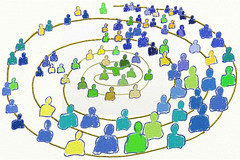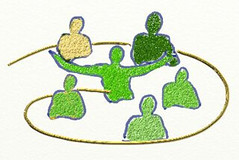Life With Alacrity
A blog on social software, collaboration, trust, security, privacy, and internet tools by Christopher Allen.
Tag: Social Software
A Revised “Ostrom’s Design Principles for Collective Governance of the Commons”
A Spectrum of Consent
The Four Kinds of Privacy
10 Design Principles for Governing the Commons
Mini Resume Card for Conference Season
Kathy Sierra of Serious Pony on Trolls
Post by Christopher Allen. original layout
Deep Context Shared Languages
“Look Up” Your Strong Ties, Connect to Your Weak Ties
Post by Christopher Allen. original layout
“The Really Big Questions” Podcast Asks “Why Do We Share?”
Post by Christopher Allen. original layout
Is the Sharing Economy Changing Our Culture of Trust?
Post by Christopher Allen. original layout
To be persuasive, you need to understand “Identity Protective Cognition”
Post by Christopher Allen. Comments Actually, the implication of the study is that argument, as the term is conventionally understood, is a myth and that persuasion is functionally impossible. Also that nobody knows anything, nor can they. S.M. Stirling 2014-06-04T16:18:36-07:00 original layout
Second Gov & The Consensus Project
Post by Christopher Allen. original layout
Dyads & Triads — The Smallest Teams
 (by Christopher Allen with Elyn Andersson and Shannon Appelcline)
Two years ago, the Bainbridge Graduate Institute (www.BGI.edu) faculty gathered to radically reinvent their sustainable business curriculum for the next decade. Our goal was not only to update course content, but also to significantly update how the material was taught. We wished to make our teaching process (our pedagogy) more interactive and also more effective for students graduating into a 21st-century work environment, where people increasingly work in teams-both online and offline.
(by Christopher Allen with Elyn Andersson and Shannon Appelcline)
Two years ago, the Bainbridge Graduate Institute (www.BGI.edu) faculty gathered to radically reinvent their sustainable business curriculum for the next decade. Our goal was not only to update course content, but also to significantly update how the material was taught. We wished to make our teaching process (our pedagogy) more interactive and also more effective for students graduating into a 21st-century work environment, where people increasingly work in teams-both online and offline.Introduction to the Social Web (Reading List #SW4SX)
These are the initial required readings for the first two weeks of my Using the Social Web for Social Change class (hashtag #SW4SX) that I teach in the MBA in Sustainable Systems program at Bainbridge Graduate Institute.
The goal of this portion of the class is to cover an introduction and overview of the landscape of the Social Web, establish among the students the beginning of a shared language about the medium, and introduce a process toward a collaborative culture that we will use for the rest of the course.
Managing your Social Graph with Google+ [Google Plus]
 With Google+ almost two weeks into its test phase, conversation about this new social network service seems to be going in circles.
Literally.
That’s because Circles is the Google+ feature that users are generating the most buzz about. It’s Google’s answer to the problem of organizing your social graph online.
If you’re not familiar with a social graph it’s a map of everyone you know and how they are related to you.
With Google+ almost two weeks into its test phase, conversation about this new social network service seems to be going in circles.
Literally.
That’s because Circles is the Google+ feature that users are generating the most buzz about. It’s Google’s answer to the problem of organizing your social graph online.
If you’re not familiar with a social graph it’s a map of everyone you know and how they are related to you.Facilitating Small Gatherings Using “The Braid”
Creative Commons Posts “Defining Noncommercial” Report
Community by the Numbers, Part III: Power Laws
 In my first article in this series I talked about community numbers: how the sizes of groups ultimately affect their success (or failure). However what I discussed only offers up the most rudimentary explanation of the dynamics, and that is because typically not all of the members of a group are equally involved.
In order to better define who constitutes the tightly-knit "participant community" upon which the group thresholds act, we have to study power laws which let us measure the intensity of individuals' involvement in a group.
In my first article in this series I talked about community numbers: how the sizes of groups ultimately affect their success (or failure). However what I discussed only offers up the most rudimentary explanation of the dynamics, and that is because typically not all of the members of a group are equally involved.
In order to better define who constitutes the tightly-knit "participant community" upon which the group thresholds act, we have to study power laws which let us measure the intensity of individuals' involvement in a group.Community by the Numbers, Part II: Personal Circles
 In my previous post, I talked about the limits on sizes of tightly-knit communities. These group limits are closely related to a number of interesting personal limits, and are often confused with them.
Unlike the group limits, personal limits actually measure something different: the number of connections that an individual can hold. They're yet another thing that you must consider when thinking about communities of people.
Personal Limits The Support Circle: This is the number of individuals that you seek advice, support, or help from in times of severe emotional or financial stress.
In my previous post, I talked about the limits on sizes of tightly-knit communities. These group limits are closely related to a number of interesting personal limits, and are often confused with them.
Unlike the group limits, personal limits actually measure something different: the number of connections that an individual can hold. They're yet another thing that you must consider when thinking about communities of people.
Personal Limits The Support Circle: This is the number of individuals that you seek advice, support, or help from in times of severe emotional or financial stress.